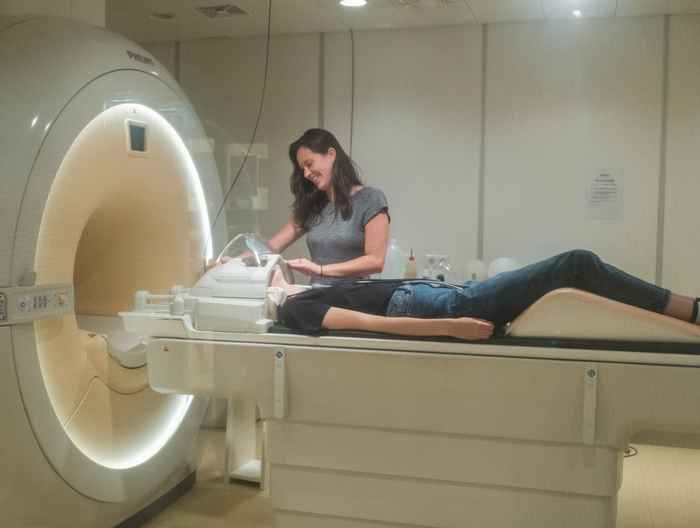Participate in MRI studies

What to expect during the scan
The researcher will explain the research to you prior to the scan. You will be informed about the background and purpose of the research. Depending on the type of research it may be necessary to add extra equipment, for instance to register your eye movements, heart rate and/or respiration. Also, some additional examination may be necessary before or after the MRI scan. You will be informed about this prior to the scan. The scanner tends to be rather noisy, which is why you will be provided with earplugs and headphones.
What is expected of you during an MRI scan
Please be there well before your scheduled scanning appointment (half an hour). MRI is expensive and time-consuming so please be on time! Should you be unable to be there for whatever reason, please inform the researchers as soon as possible, so that another participant may take your slot. A typical experiment lasts approximately 45-60 minutes. It is vital that you remain still during the scanning procedure, as deviations of just a few millimetres may suffice to render the data useless. Try and relax when you’re in the scanner; the researcher will try to make you as comfortable as possible, for instance by putting cushions under your knees and elbows.
How to prepare for an MRI scan
As the MRI scanner makes use of a strong magnetic field you should wear clothing that does not have metal zips, buttons or buckles. Do not wear a bra with underwiring, and avoid heavy use of eye make-up or hair products. Tattoos and tattooed eyeliner are okay, provided they have been done with metal-free ink. Please wear or bring comfortable metal-free clothes: please note that your shirt should cover the top half of your body completely and that your sleeves should cover at least part of your upper arms. Please remove piercings and don’t wear jewellery. Typical jeans have copper buttons and zipper and are generally safe to wear.Please make sure you wear or bring socks to wear during your scan to prevent skin-to-skin contact.
Screening for MRI research
A screening will take place prior to your scan. Please keep in mind the following:
Metal objects
An MRI scanner is in essence a strong magnet, which means you will not be able to participate if you carry any metal inside your body. Think implanted pacemakers, medicine pumps, aneurism clips, artificial heart valves, cochlear implants and piercings that cannot be removed. Please inform us if you have ever had a serious accident where fragments of metal have ever entered your eyes or if you work with metal. Orthodontic braces and retainers do not pose a safety threat but may distort certain MRI signals and you may be excluded on that count. Tattoos are safe, but have to be mentioned on the MRI-screening form. You will be asked to fill out a screening questionnaire prior to the scan. For your own safety it is vital that you answer the questions truthfully.
Claustrophobia
While in the MRI scanner, your head and upper body will be lying in a relatively narrow cylinder. For most people this is not a problem, but if you are suffering from mild claustrophobia, please inform the researcher conducting the study. If you are suffering from severe claustrophobia, it is not recommended to participate in an MRI research for purely scientific purposes.
Pregnancy
You are not allowed to participate in MRI studies at the FMG Lab when you are pregnant.